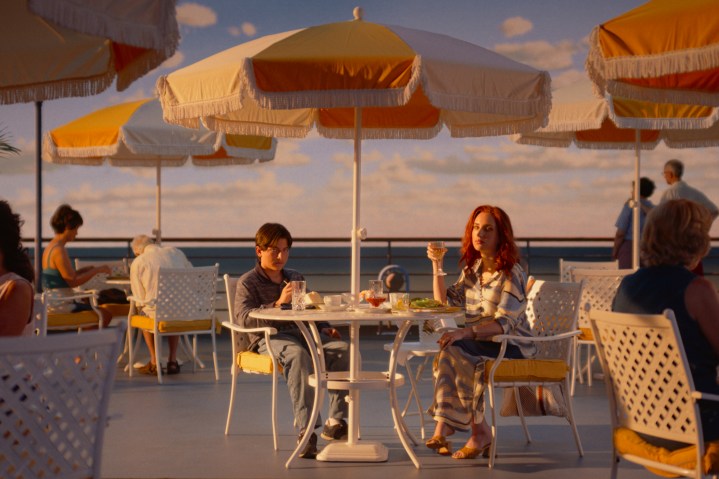
“Hereditary and Midsommar director Ari Aster's latest film, Beau is Afraid, is a shockingly bad epic that will leave you wishing you could get the three hours it cost you back.”
- Patti LuPone, Zoe Lister-Jones, Parker Posey, and Nathan Lane's scene-stealing supporting performances
- Ari Aster's engaging visual style
- Joaquin Phoenix's bumbling, one-note lead performance
- Ari Aster's annoying, needlessly mean-spirited script
- A runtime that's far too long and self-indulgent
There are some filmmakers who relish in the spontaneity of life and whose films feel alive and unpredictable. Ari Aster is not one of those filmmakers. Aster is a director who doesn’t just demand control, but who constantly communicates it. There’s not a moment to be found in either of Aster’s first two films, Hereditary and Midsommar, that doesn’t feel like it was planned and executed exactly according to his vision.
In both of those films, the vicelike grip of his direction is a necessity. Through the unwaveringly smooth pans and methodically composed shots of his camera, Aster creates the sense in his first two features that his characters are not in control of their own stories, which only makes the horror of their lives feel all the more suffocating.
In Beau is Afraid, Aster’s style becomes a crutch, then a liability, and eventually a source of irritation. The writer-director’s latest is a three-hour tour through the life of a man who is, as the film’s title suggests, afraid of just about everything. As played by Joaquin Phoenix, Aster’s latest protagonist is a cartoonish avatar of pure, unadulterated anxiety. While it elicits much of the same dread as the director’s previous efforts, Beau is Afraid isn’t a horror film. It is, instead, a zany comedy about the cumulative cost of guilt, lies, and all of the other, toxic emotions that can drag a person down.
With its multilayered story and mean-spirited sense of humor, there are moments when the film feels like the Frankensteinian result of a creative marriage between the Coen Brothers and Charlie Kaufman. Unfortunately, Aster lacks the wry cleverness of the former and the heartbroken humanity of the latter. He isn’t interested in exploring the themes of his films so much as he is in repeatedly beating his characters with them until they inevitably succumb to madness, death, or both. In Beau is Afraid, Aster extends his fascination with the perpetual torment of life to his audience — punishing his viewers for nearly three hours for daring to hope that there might actually be more to one’s life than guilt, suffering, and manipulation.

Beau is Afraid begins, as any movie about one man’s immense case of Mommy Issues should, in a therapist’s office. Through his opening conversation with his therapist (Stephen McKinley Henderson), the debilitating insecurity of Phoenix’s Beau Wasserman is laid bare, as are his plans to visit his mother, Mona (Patti LuPone). When Henderson’s therapist, whom the actor plays with an unsettlingly Cheshire Cat-like grin, compares LuPone’s Mona to a well that doesn’t contain any water, we immediately know everything we need to about Beau’s relationship with his mother.
Where Beau is Afraid goes from there is less immediately clear. The film follows Phoenix’s beleaguered, gullible sad sack as he tries to get home for a visit that Mona has made him feel very bad about possibly missing, but to call his journey a straight line would be akin to calling Beau is Afraid’s runtime “lean.” Along the way, Beau loses the keys to his apartment, gets hit by a car, ends up in the care of an oddly possessive couple (played with simmering insanity by two of the film’s scene-stealers, Nathan Lane and Amy Ryan), and then finds himself attending a theater performance in the woods. This is all before he finally does make it home in time for a horrifyingly ridiculous encounter with his childhood crush, Elaine (Parker Posey).
The latter scene feels like Aster wrote it in film school on a dare. That is to say that it is, on the one hand, rebellious and unlike anything you’ve ever seen before, and on the other, dumber and more juvenile than you could possibly imagine. The same can, unfortunately, be said for much of Beau is Afraid. It’s the rare film that proves that “unique” isn’t always a compliment, and neither is “shocking.” Make no mistake: Beau is Afraid is a shocking film. In its second and third hours, though, the film so thoroughly burns through whatever goodwill it earned with its initial moments of subversion that it’s impossible not to meet its final series of twists with an increasingly exasperated succession of sighs and eye rolls.

Beau is Afraid’s mind-numbingly misguided third act is made all the worse by just how repetitive and drawn-out the rest of the movie is. The film follows Beau across a series of strange misadventures, most of which follow the same cycle of confusion, injury, and Looney Tunes-esque escape. Only the film’s first act, which depicts Beau’s desperate attempts to get out of the anarchic city block where he lives, feels worthwhile. The section is constructed out of a series of set pieces, poor choices, and subversive twists that effectively submerge the viewer in both the film’s slowly disintegrating modern world and the anxious mind of Phoenix’s protagonist.
Once Beau is taken away from his apartment, though, the immersion that Aster achieved throughout the film’s first act is lost. The writer-director continues to humiliate and denigrate Phoenix’s Beau to the point that his authorial hand becomes unavoidably present and obvious. Before long, Beau is Afraid no longer feels like an examination of one man’s journey into the past, but more like an exercise in gleeful torment on the part of its creator. Even when the film’s midpoint theater sequence, which throws in some visual variety with its use of green screen effects and animation, seems like it is on the verge of bringing new meaning and heart to Beau is Afraid’s painful odyssey, Aster can’t help but insert himself yet again by reminding his protagonist that any attempt to find catharsis in his story is for naught.
The snide quality of the sequence’s conclusion just makes Aster’s clear allusions to the work of singular artists like Don Hertzfeldt, Michel Gondry, and Charlie Kaufman feel all the more unearned. Beyond that, it’s one of several sections in the film that has the potential to broaden the thematic and emotional territory of Beau is Afraid, but is nonetheless made perfunctory by a last-minute joke on the part of Aster. Altogether, the cyclical nature of many of the film’s sequences just makes its bloated runtime feel increasingly unjustified and vain. Behind the camera, Aster seems aware that Beau is Afraid is longer than it should be, but that awareness doesn’t make the experience of watching it any less tiresome or grating.

The film’s immature sense of comedy and provocation is made all the more exasperating by just how accomplished so many other aspects of it are. Aster has, perhaps, never felt as visually in control as he does here. Across its runtime, Beau is Afraid offers enough moments of brilliant visual construction that it’s impossible not to be impressed by some of Aster’s compositional and editorial decisions. That’s particularly true for one sequence in the film in which Zoe Lister-Jones gives a monologue as the younger version of LuPone’s Mona. Aster not only holds a static, low-angle on Lister-Jones for the entirety of the scene but relies on just one light source: a revolving, multicolored night light, which bathes Mona’s face in multiple colors even as the rest of her body remains shrouded in darkness.
In terms of visual elements, the scene is relatively simple, but the effect it achieves is equal parts unsettling and hypnotic. It’s a moment in which Aster’s ability to highlight the mundane horrors of everyday life is strikingly clear, and it also offers viewers a glimpse at a version of Beau is Afraid that could have been far more tolerable and interesting than the one Aster has delivered. Despite the strong work done by many of the film’s cast members (Lister-Jones and LuPone turn in particularly memorable performances), what could have been a thoughtful, nightmarish portrait of one man’s life has instead been rendered as a screeching, childish exercise in emotional torment that doesn’t even have the decency to justify its own perversely sadistic streak.
It’s the film equivalent of the kid on the school bus who spends every day poking at your back because he just can’t get over how funny he finds annoying other people to be. You know the kind. The one that other people point to and say, “Whatever you do, just try not to be like that kid.” Beau is Afraid is very much that kid.
Beau is Afraid opens in theaters nationwide on Friday, April 21.
Editors' Recommendations
- 3 underrated 2023 movies on Paramount+ you need to watch in 2024
- This is the one 2023 movie I absolutely loved. Here’s why you should watch it
- Rosaline review: Kaitlyn Dever lifts up Hulu’s Romeo and Juliet rom-com riff
- Conversations with A Killer: The Jeffrey Dahmer Tapes review: killer’s words yield little insight
- Amsterdam review: An exhausting, overlong conspiracy thriller




